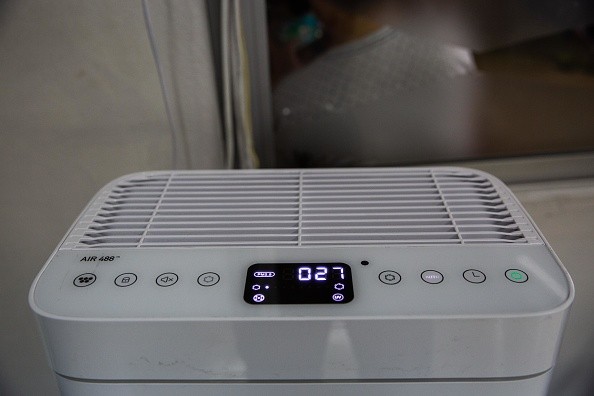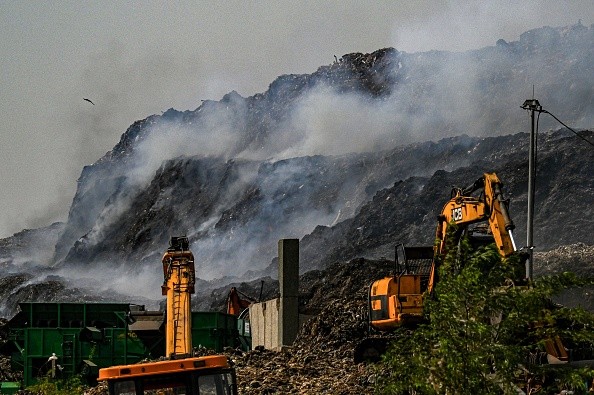When you think about air pollution, you possibly do not even visualize anything inside your house or place of business.
Because we spend so much time indoors, cold weather, the quality of air in your home, car, and place of work must be as clean as possible.
Unfortunately, we are the ones who bring the majority of this pollution indoors.
A recent study found that having a small air purifier at home can lessen the harm that pollution causes to children's neurodevelopment.
Portable Air Cleaner
 (Photo : Lauren DeCicca/Getty Images)
(Photo : Lauren DeCicca/Getty Images)

To investigate the benefits of using air filters to reduce exposure to pollution during pregnancy and to assess the impact on children's intelligence, researchers from Simon Fraser University collaborated with American and Mongolian experts, ScienceDaily noted.
The study's authors noted that it is the first of its kind to demonstrate how limiting pollution can affect children's intelligence.
For the Ulaanbaatar Gestation and Air Pollution Research or UGAAR project, the researchers in Ulaanbaatar, Mongolia, started enlisting 540 expectant women in 2014.
Ulaanbaatar has some of the worst air quality in the world, far exceeding WHO standards.
The women have been less than 18 weeks in labor, were nonsmokers, and had never used air filters in their homes.
One or two HEPA air filters were given to the intervention group, and they were urged to use them consistently during their childbearing stage.
Once the baby was born, the air filters were taken out of the house.
The researchers measured the children's full-scale intelligence quotient (FSIQ) at age four using the Weschler Preschool and Primary Scale of Intelligence.
They found that children of the women who used air filters during the childbearing stage had an average FSIQ that was 2.8% higher than children of the group who did not.
These findings, along with information from earlier studies, suggested that pollution in the air creates a risk to neurodevelopment, according to Ryan Allen, professor of environmental health at SFU's Faculty of Health Sciences.
The great thing is that reducing exposure has unquestionable benefits.
According to the results of their study, limiting exposure to air pollution while a woman is pregnant may benefit her child's overall neurodevelopment.
Allen continued by saying that kids are prevented from learning these skills because polluted air is a global issue.
While air filters might provide some protection, ultimately the only way to ensure the security of all children is to reduce pollution.
Also Read: Air Purifiers: Do They Really Work? Here are its Benefits for Air Quality
Disease caught indoors by air pollution
 (Photo : PRAKASH SINGH/AFP via Getty Images)
(Photo : PRAKASH SINGH/AFP via Getty Images)

Long-term lung conditions like asthma or Chronic Obstructive Pulmonary Disease (COPD) flare-ups can be more common when there is indoor air pollution, as per Cleveland Clinic.
According to Dr. Sumita Khatri, a pulmonologist, exposure to household air pollution can inflame asthma and other respiratory conditions, as well as the nose, throat, and eyes.
Longer-term impacts from overexposure can be more difficult to quantify, such as the likelihood of developing lung cancer from health risks and exposure to second and third-hand smoke.
Ventilating System, Air Filters, and its role
Even though opening a window promotes ventilation in your house, vehicle, or place of business, it isn't always possible because of allergies or severe weather.
Planning about regular HVAC monitoring and consider using air filters can help.
Related Article: Kidney Diseases May Be Caused By Air Pollution
© 2024 NatureWorldNews.com All rights reserved. Do not reproduce without permission.

![Tsunami Hazard Zones: New US Map Shows Places at Risk of Flooding and Tsunamis Amid Rising Sea Levels [NOAA]](https://1471793142.rsc.cdn77.org/data/thumbs/full/70325/280/157/50/40/tsunami-hazard-zones-new-us-map-shows-places-at-risk-of-flooding-and-tsunamis-amid-rising-sea-levels-noaa.jpg)



